Originally scheduled for August 31, the matchup between Miami and Florida football was pushed up to celebrate college football’s 150th anniversary.
On March 7, the NCAA approved a petition by the Miami Hurricanes and Florida Gators to push up the matchup at Camping World Stadium in Orlando forward one week in the August calendar. As a result, the game will get increased exposure as it occupies a spot in the season that was previously only reserved for a select few season-opening classics on the annual calendar through the last years of the 20th century.
The move was spearheaded not by either school but by ESPN, as the broadcaster looked to generate more interest in a matchup between two storied programs whose annual rivalry went dormant and has only been played six times since 2001.
There are several benefits to such a move. The clearest boon of such a move is that it provides two storied programs in the Sunshine State with a more prominent platform for their neutral-site duel in Orlando. While the game between intrastate rivals has traditionally been less important for both teams than their annual duels with Florida State, there is enough history between these two schools to make this a must-see affair.
Beyond that, though, it also provides much-needed flexibility to the schedules of two programs who have been forced to deal with the impacts of inclement weather in recent seasons. At a point in the sport’s history when actual hurricanes have led to cancellations, postponements, and a slew of last-minute rescheduling, the Hurricanes and Gators will both benefit from extra space in the calendar.
We could easily see this become a more frequent trend, especially among teams from the southeastern part of the country, as teams look for not only more exposure but also more of a buffer to cope with climate change.
Before the NCAA opened the door for every FBS team to play 12 games, the idea of playing in August was an absolute novelty reserved for top teams playing in games like the Kickoff Classic, the Pigskin Classic, and the Eddie Robinson Classic. Even with more teams playing before September than ever before, though, this game still evokes the spirit of those previous must-see events.
Will this become more of a trend around college football? Two decades ago, the growth of opening-week feature contests led the NCAA to allow for a universal 12th game. This time, such moves could provide not only great public relations but also a blueprint for more teams to play a full 12-game regular season despite the impacts of anthropogenic climate change.
